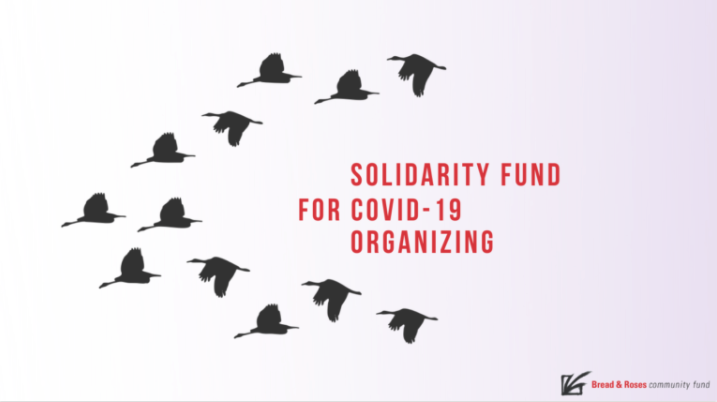COVID-19 has created a double bind for grassroots organizations. Communities need them now more than ever, but the pandemic makes their collaborative, on-the-ground work harder to strategize and execute. Just as impacted individuals benefit from grassroots initiatives, grassroots organizers need aid from groups that know and value their work. Luckily, Bread & Roses Community Fund is serving this function for the Philadelphia area during COVID-19.

Launched in 1977, Bread & Roses is dedicated to funding movements for change, with $13 million given to local grassroots groups to date and a focus on racial equity and economic opportunity for all. The organization’s name is derived from the rallying cry “Bread and Roses” used by striking textile workers in 1912, originally sourced from a James Oppenheim poem: “Our lives shall not be sweated from birth until life closes. / Hearts starve as well as bodies; give us bread, but give us roses!”
What Bread & Roses Community Fund did
The team at Bread & Roses quickly identified a need in their community around grassroots organizing, given the struggles disproportionately impacted groups would face (people of color, poor people, immigrants, people with disabilities, incarcerated people, people experiencing homelessness) in tandem with new obstacles around grassroots work.
As Director of Communications and Development Caitlin Quigley shares, “We saw that the pandemic created an unprecedented need for grassroots community organizing in the Philadelphia region, and that fallout was landing hardest on communities already targeted by systems of oppression. And at the same time, the pandemic made it incredibly challenging to do grassroots work because of distancing and the different types of isolation that people were experiencing.”
How they did it
In order to maximize the impact of these grants, Bread & Roses elected to flexibly serve a range of groups through the Solidarity Fund.
“One of our priorities,” Quigley says, “is welcoming existing grantees and other established community organizing groups who just need grants to stay afloat—to make rent or payroll—during this crisis, regardless of the type of work they’re doing. Secondly, we are encouraging applications from any groups using community organizing in response to the pandemic to demand just and humane solutions from governments, corporations and other institutions, even new groups.”
This second goal resulted in a slightly unorthodox approach: Bread & Roses is granting eligibility to organizing groups without nonprofit status.
“We’re able to make a limited number of grants to groups that are not 501(c)(3),” Quigley says, “which is very exciting. We just really feel like there’s a lot of new organizing emerging that needs to be happening so we want to encourage that and support it.”
In addition to the difficulty and expense of obtaining a 501(c)(3) designation even during non-pandemic times, the burden of organizing remotely, especially for new groups, is something to which the team at Bread & Roses is sensitive.
According to Quigley, “There’s just a ton of digital divide issues and digital literacy issues for groups getting up to speed and doing remote work. Some examples I can think of are organizing for safe workplaces, including trying to get personal protective equipment for people who are on all different front lines of this crisis. Also, organizing to demand that institutions like jails, prisons, and detention centers keep people safe and healthy or release people.”
In addition to broadening grant eligibility, Bread & Roses is cognizant of reducing workload throughout the funding process, from application to reporting.
“Our normal reporting is not laborious,” Quigley says. “There’s a certain amount of information that we need to get but we want a happy medium, where what our grantees provide isn’t overwhelming and the whole process is as easy and seamless as we can make it.”

The shift at Bread & Roses to focus on funding COVID-19 was not without obstacles, in particular around operating expenses.
As Quigley says, “We launched this fund because it’s an important need and this is why we exist. But also, people giving money to this fund means people are not giving money to our general operating fund. And many people who might’ve been planning to give a certain amount this year aren’t going to be able to do so at that level anymore.”
Still, it’s clear to the leadership at Bread & Roses that the significance of the work they’re doing currently supersedes other concerns.
According to Quigley, “We’re trying to figure out our options at the same time that we work to fulfill our mission. Right now it feels most important that we follow through on this and meet this need.”
The grant review and selection process for these emergency grants will be carried out by community members.
“We convened a small community grantmaking committee,” says Quigley. “No staff members will make decisions about where the money goes.”
Bread & Roses also opted against rushing to launch their grants.
“We waited until we were really ready to go,” Quigley says, “because we didn’t want to be building systems as the process was underway.” As Quigley shares, this allowed them to be confident they could get the money out to groups quickly once decisions were made.
What’s next
The Solidarity Fund for COVID-19 Organizing has a rolling deadline and every Monday applications from the previous week are reviewed. Grants so far have gone to groups with focuses including unemployment, bail, restaurant health and safety, immigrants in detention, LGBTQ individuals, and communities of color.
Bread & Roses is continuing to fundraise: they’ve received gifts from more than 150 people and have raised $415,000, with $192,000 awarded in grants to date. This assistance is aimed at helping now but also building for the future.
“We believe that preventing further mass tragedy requires community organizing in order to work effectively for a just response from governments, corporations, and other institutions,” says Quigley.
Learn about how Submittable can help your organization respond to COVID-19. For more on groups like Bread & Roses giving back through emergency grants, check out this recent spotlight.